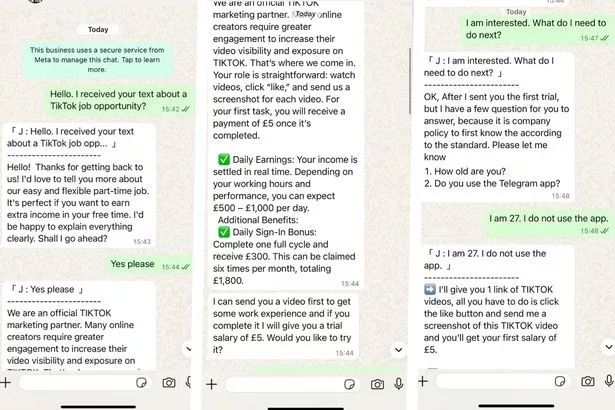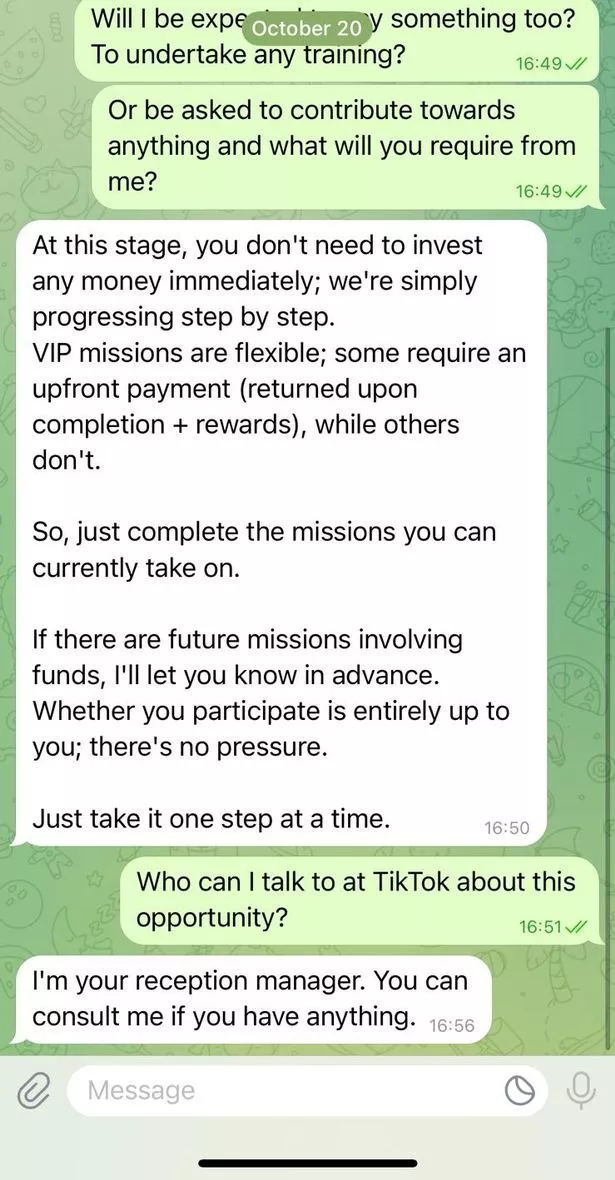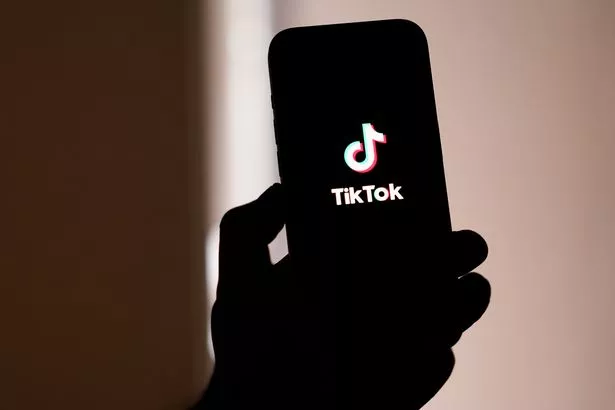MEN INVESTIGATION: It took just minutes to be asked for bank details after chatting with online fraudsters claiming to be from the popular social media app. James Holt reports.
05:12, 26 Oct 2025Updated 07:48, 26 Oct 2025
 Fraudsters are continuing to pose as TikTok employees(Image: Manchester Evening News)
Fraudsters are continuing to pose as TikTok employees(Image: Manchester Evening News)
Fraudsters are continuing to pose as TikTok employees to trick victims into signing up to easy, non-existent jobs and surrender their bank details, a Manchester Evening News investigation has found.
The scammers typically send flare text messages to mobile numbers at random, often looping recipients into large group messages to offer a lucrative, home-working business opportunity for extra cash.
The messages promise the chance to earn between £300 and £1,000 per day, with a ‘guaranteed’ monthly salary of up to £10,000 in order to ‘support the expansion’ of the social media app.
Senders usually claim to be from ‘TikTok HR’ and tell recipients they believe they are ‘a great fit’ for a ‘flexible part-time online opportunity’.
Join the Manchester Evening News WhatsApp group HERE
Text messages have been being sent at random for some time, with social media app TikTok previously issuing a warning about receiving ‘unsolicited messages to individuals’ which invites them to perform tasks such as following accounts or liking or commenting on content for monetary benefit.
 The scammers purport to be from social media site TikTok(Image: Getty Images)
The scammers purport to be from social media site TikTok(Image: Getty Images)
The social media app said explicitly that the messages are scams and that TikTok and its partners ‘do not operate in this way’, urging people to ‘be vigilant and think twice before sharing personal information or sending money’.
Between August 1 and August 31 this year, Action Fraud data revealed there were a total of 251 TikTok online scams reported. 112 of those were identified as a victim of job or recruitment fraud relating to the platform.
In Greater Manchester, police equally confirmed they had received an influx in reports of people falling victim to the social media scams in recent months, often mentioning TikTok, with many being shafted out of as much as £1,000.
The text messages typically contain a link, encouraging users to find out more about the proposed opportunities. Action Fraud states that cyber criminals use fake messages ‘as bait’ to lure victims into clicking links which are often malicious and can steal passwords, data or install viruses.
The scammers then often ask for bank details or payment as a registration fee before gaining access to various job listings and ask to chat via encrypted messaging app Telegram.
 The text messages are often initially sent to multiple numbers at random(Image: Manchester Evening News)
The text messages are often initially sent to multiple numbers at random(Image: Manchester Evening News)
One message read: “Hello! I’m Amelie from TikTok’s HR department. We’re pleased to offer you a part-time-work-from-home role to support our business expansion.
“Working hours; 60 to 90 minutes per day. Daily pay: 300 GPB to 600GBP. Guaranteed monthly salary: 10,000 GBP.
“Add me on WhatsApp to receive an 8 GBP bonus!”
Another message shared with the Manchester Evening News claimed the recipient would be ‘a great fit for a remote online opportunity’ and promised daily earnings of between £500 and £1,000 per day depending on availability.
We clicked the link on the text message and spoke directly with scammers about the ‘job opportunity’, which involved liking various videos posted on the site for profit.
The hyperlink opened up a WhatsApp chat option with a UK-based mobile number. After initially messaging, the mobile number informed us they were ‘an official TikTok marketing partner’.
The message added: “Many online creators require greater engagement to increase their video visibility and exposure on TikTok. Your role is straightforward: watch videos, click ‘like’ and send us a screenshot for each video. For your first task you will receive a payment of £5 once it’s completed.”
 We began chatting on WhatsApp after clicking the text link(Image: Manchester Evening News)
We began chatting on WhatsApp after clicking the text link(Image: Manchester Evening News)
The user then sent the link to a TikTok video, which we liked and screenshotted as proof. We were then given a ‘job code’ and told to message an account using encrypted messaging service Telegram to discuss the job opportunity with a ‘TikTok business manager’ and to ‘settle wages’ and ‘become an official partner’.
Once moved to Telegram, we began messaging with an account called ‘Sophia’, claiming to be from the ‘officially certified partnership system’ within TikTok, who then informed us she would give a brief introduction to the company and the salary of the position, which was between £120 and £500 per day.
It took just ten minutes for us to then be asked for our bank details.
 We were then moved to talk to a ‘manager’ on Telegram who quickly asked for bank details(Image: Manchester Evening News)
We were then moved to talk to a ‘manager’ on Telegram who quickly asked for bank details(Image: Manchester Evening News)
We were told we would then receive £5 commission. We asked what else we would be required to do, and were instantly told again to ‘provide bank account information’.
When we then asked about the role of the job, the account became more elusive. “I will introduce our work to you later,” the short response read.
“I am not giving out my bank details without knowing about the work involved,” we responded. The account replied: “Our daily work is to like videos.”
We also asked the Telegram user if we would be expected to pay anything to undertake training or make any financial contributions, as had happened in other reported cases.
They responded: “At this stage you don’t need to invest any money immediately. VIP missions are flexible; some require an upfront payment (returned upon completion and rewards), while others don’t. If there are future missions involving funds, I’ll let you know in advance.”
Lloyds Bank previously said that VIP upgrades can often involve crypto wallets or platforms for task completion, with some victims manipulated into forwarding money or acting as intermediaries, leading them to unknowingly becoming money mules – which constitutes a criminal offence.
Raising questions about the legitimacy of the proposal, we then asked the user who we could talk to directly at TikTok about it, to which we were told: “I am your reception manager. You can consult me if you have anything.”
 The fraudster quickly became evasive when we asked about contacting TikTok
The fraudster quickly became evasive when we asked about contacting TikTok
After our interaction, we told both the WhatsApp user and Telegram user that we were journalists investigating the scam. The WhatsApp user did not reply, with the Telegram account responding: “OK, please contact TikTok.”
In a post on their website in 2024, TikTok urged users to be wary of scams that ‘appear to originate’ from the app.
“It has come to our attention that scammers have been using the TikTok name to entice their victims. This typically involves scammers creating group chats or sending unsolicited messages to individuals, inviting them to perform a range of tasks such as following TikTok accounts or liking and commenting on content for monetary benefit, or offering individuals job opportunities at TikTok,” the statement read.
“Please be informed that such messages are scams. TikTok and its partners do not operate in this manner. Please be vigilant and think twice before sharing personal information or sending money. Always check your sources of information.”
TikTok also said it operates in accordance with financial and legal compliance standards. When cases of misuse are reported to the app, it is assessed in line with policies and applicable laws.
Earlier this year, Greater Manchester Police said a number of people had fallen victim to the social media employment scam, including five in a week in June. The scams typically involve directing victims to fake websites or Telegram chats, charging a registration fee to access job listings and promising profits in return for ‘small investments’.
And in August, Lloyds Bank said cases of advanced fee job scams had risen by 237 per cent in 2025, with victims losing £1,420 on average. Some victims lost over £5,000. The bank said 53 per cent of all cases involve victims aged 18 to 34.
 The scams often encourage people to like TikTok content for quick profits(Image: Getty Images)
The scams often encourage people to like TikTok content for quick profits(Image: Getty Images)
“Scammers lure victims with fake job offers which can sometimes involve simple online tasks – such as liking TikTok videos or reviewing hotels,” it said. “Victims are promised commissions and high earning opportunities from the comfort of their own homes, but first they must pay upfront fees for application processing, training, DBS checks or even visa sponsorship – known as ‘advanced fees’. Once payments are made, victims are often ghosted or blocked.
“Victims may make more than one payment during the scam, sometimes paying for ‘VIP’ upgrades for higher earnings or ‘taxes’ and ‘processing fees’ to access commissions made.
“Some scams involve crypto wallets or platforms for task completion, and some victims are even manipulated into forwarding money or acting as intermediaries—unknowingly becoming money mules, an activity that constitutes a criminal offence.”
Anyone who thinks they may have been a victim is urged to stop communication and report the sender’s details to Action Fraud. If money has been sent, victims are urged to contact their bank immediately.
Detective Sergeant Stacey Shannon, from GMP’s Economic Crime Unit, said: “A job scam is a fraudulent scheme where criminals pose as employers or recruitment agencies to deceive job seekers. These scams can take various forms but the ultimate goal is to either steal money, personal detail – or both.
“Scammers often use fake job listings, impersonate reputable companies, or contact victims directly through social media, emails, and even job boards.
“Victims may be asked to pay upfront fees for training, provide sensitive personal information, or accept fraudulent job offers that lead to financial loss.
“These scams do not just target those actively searching for work. Some fraudsters contact people out of the blue with unsolicited job offers, making the opportunity seem too good to pass up.
“Scammers create videos claiming to offer easy, high-paying remote jobs, often requiring minimal effort. Many of these scams target young people looking for flexible online work, making them particularly dangerous. If you believe you have fallen for one of these scams, please report it to the police.”
Meta said it is rolling out new WhatsApp tools to help people spot scams. Over 6.8 million WhatsApp accounts linked to criminal scams globally have been removed from the platform in the first six months of 2025 alone.
The new tools include launching a ‘safety overview’ that is shown when someone who is not in someone’s contacts is added to a WhatsApp group or chat, including key information about the group and tips to say safe.
To protect users against individual messaging, WhatsApp said it is also exploring ways to show people details about numbers not in their contacts, including additional context about who they are messaging before responding. Contacts can also be blocked or reported.

